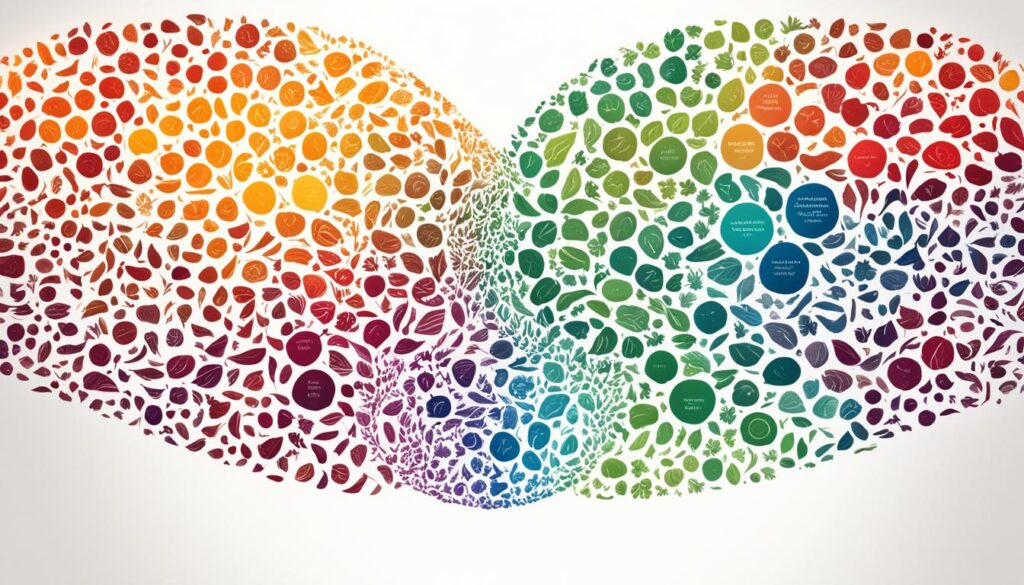Mental health is vital for our well-being. It includes emotional, psychological, and social wellness. These things affect how we perceive, feel, and behave. Mental health is key at all life stages. It helps us deal with stress, build strong bonds, and reach our top potential. When we focus on this, we set ourselves up for a happier and healthier life.
Key Takeaways:
- Improving mental health is essential for coping with stress and achieving personal growth.
- Mental health includes emotional, psychological, and social well-being.
- It influences thoughts, feelings, and behavior, impacting various areas of our lives.
- Prioritizing mental health leads to better relationships and a more fulfilling life.
- Strategies for improving mental health can enhance overall well-being and happiness.
What is Mental Health?
Mental health covers how we feel, think, and relate to others. It’s key for dealing with life’s challenges. Good mental health helps us manage stress, build healthy relationships, and grow as individuals.
To keep our mental health in shape, we need to work on our feelings and thoughts. This includes recognizing and managing our emotions well. It also means looking at ourselves in a positive way, finding our purpose, and facing challenges head-on. And, it involves connecting with others, caring for the people around us, and being part of our communities.
When we’re mentally healthy, we’re better at handling life. We can live our lives to the fullest and deal with tough times. It’s all about being active, happy, and able to achieve our goals.
Components of Mental Health
There are three big parts to mental health. They all work together:
- Emotional Well-Being: Dealing with our feelings, managing stress, and adapting to challenges are part of this.
- Psychological Well-Being: This involves seeing ourselves in a good light, having a purpose, and wanting to grow.
- Social Well-Being: It’s about making strong relationships, feeling connected, and helping others in our communities.
All these parts rely on each other. By taking care of each one, we can have a healthy overall mental state. This means a more complete way to keep our minds well.
Why is Mental Health Important?
Mental health is key for a happy, meaningful life. It helps us cope with challenges and affects our physical health, relationships, and success.
Taking care of our mental health guides us through life’s highs and lows. It keeps us well in overall health. A positive mind helps us deal with stress and become strong to face difficulties.
Our mental and physical health are deeply tied. Good mental health leads to better physical health. It encourages us to exercise, eat well, and sleep enough, improving our health.
Mental health is vital for strong friendships and love relationships. Focusing on our mental health helps us build deep connections. These connections are crucial for our emotional health and offer support in tough times.
“When individuals prioritize their mental well-being, they are better equipped to form deep connections with others, foster intimacy, and maintain healthy boundaries.”
It’s also crucial for being productive and reaching our goals. A positive mind helps us concentrate, make good choices, and remain enthusiastic. This leads to personal and career success.

| Importance of Mental Health: | How it Affects |
|---|---|
| Physical Health | Individuals with good mental health are more likely to engage in healthy behaviors such as regular exercise, proper nutrition, and sufficient sleep. |
| Relationships | Maintaining mental well-being enables individuals to form deep connections, foster intimacy, and maintain healthy boundaries in relationships. |
| Productive Work | Positive mental health fosters focus, motivation, and decision-making, leading to increased productivity and optimal performance. |
| Full Potential | Prioritizing mental well-being empowers individuals to unlock their capabilities and achieve their full potential in various aspects of life. |
How Can I Improve My Mental Health?
Improving mental health is vital for a happier and healthier life. You can boost your mental well-being by adopting certain strategies. Make them a part of your daily life to feel better and look at life more positively.
Staying Positive
Keeping a positive attitude is key for better mental health. It means trying to balance positive and negative feelings. Focus on the good in situations and try not to worry too much about the future. Doing this can make you more resilient and hopeful, which is good for your mind.
Practicing Gratitude
Feeling thankful for the good things impacts your mental health greatly. Every day, take a moment to think about what’s going well in your life. This helps you focus on the now and brings joy and peace.
Taking Care of Physical Health
Your physical and mental health go hand in hand. Working out, sleeping well, and eating right are good for your mind. Exercise releases hormones that make you feel good and cuts down on stress. Getting good sleep and eating well also help keep your emotions in check.
Fostering Social Connections
Having strong social support is important for your mental health. Be around people who are positive and supportive. It makes you feel part of something, not alone. Joining clubs or doing activities you like helps you meet people and form deep connections.
Developing Coping Skills
Learning to cope effectively with stress is crucial. Knowing how to solve problems, relax, and manage stress helps you deal with tough times. These skills make you stronger, emotionally.
Exploring Mindfulness Practices
Being mindful with meditation can improve your mental health. It sharpens your focus, helps you relax, and reduces stress. Mindfulness is all about living in the moment, being aware of your thoughts, and finding peace.
By making these strategies a habit and putting your mental health first, you can make big strides in feeling better. This leads to a more satisfying life.
Staying Positive
To improve mental health, focus on being positive. It’s important to balance good and bad feelings. It’s okay to think about bad times but not all the time. Try to look for the good things and enjoy them.

Finding Balance
A positive mindset isn’t about ignoring the bad. It’s about dealing with the bad but also finding joy. This balance lets you stay happy during tough times.
Practicing Gratitude
Being thankful really helps you stay positive. Every day, think about what makes you happy. This can really lift your spirits and lower stress.
Mindful Social Media Use
Social media can affect how you feel. Be careful how you use it. Avoid negative posts and find groups that make you feel good. This can make your online life better.
“Staying positive is not about ignoring negative emotions, it’s about finding a healthy balance and focusing on the positive aspects of life.”- Anonymous
Cultivating Positive Experiences
Do things that make you happy. Being active and spending time with people you love is great for your mind. This can make you feel better every day.
Keeping Perspective
Life has ups and downs for everyone. Instead of just the bad, look at what you can learn. Seeing the bigger picture helps keep you positive.
The Power of Staying Positive
Being positive helps your mental state in so many ways. It lets you be strong and thankful, even when things are hard. Remember, being positive is a journey. Be proud of the steps you take.
Taking Care of Physical Health
Mental and physical health are linked. It’s key to focus on your body. Exercise, sleep, and good food help you stay well and keep your mind sharp.
The Benefits of Exercise
Moving your body makes you both fit and happy. It lowers stress and makes you feel good by releasing endorphins. This helps with anxiety and depression. Also, it helps you sleep better, gives you more energy, and makes you smarter.
The Importance of Sleep
Sleep is crucial for a healthy mind. It helps you stay calm and focused. Good sleep boosts your memory and helps you think better. Aim for 7-9 hours each night with a steady bedtime routine.
Healthy Eating for Mental Well-being
Eating right feeds your body and mind. Fill up on fruits, veggies, whole grains, and lean meats. These foods give you the stuff your brain needs and reduce the risk of mental illness.
The Role of Social Connections
Being with others is good for your mind. Strong friendships and group activities help you handle life’s ups and downs better. Chat with friends, join clubs, or take part in community events to stay connected.
To sum up, looking after your body is key for mental health. Exercise, sleep, eating well, and being social all help. Make these things a priority to be happier and healthier.
Developing Coping Skills
Dealing with stress and challenges is key to staying mentally healthy. Coping skills are different ways that help us handle tough times and our feelings. These strategies include solving problems, being flexible, staying strong, and managing stress.
Problem-solving is key in coping. It means finding and using solutions to issues. It lets us take problems step by step, thinking of ways to solve them. Skills like thinking of many ideas and checking what might work best help us deal with stress.
“Problem-solving is not about finding the perfect solution; it’s about taking action and continuously adapting to overcome obstacles.” – Anonymous
Adaptability helps us change and do well in new situations. It means being open to new ideas and flexible. Being adaptable makes it easier to face the unknown and stay positive by coming up with new ways to solve problems.
Being able to bounce back is where resilience comes in. It’s about recovering from tough times and staying strong inside. We can get better at this by having people who support us, taking care of ourselves, and thinking that we can grow from hard times. This makes getting through challenges possible, keeping our minds in a good place.
Managing stress well is also important. It means knowing what makes us feel stressed and doing things that help us feel better. These can be things like deep breaths, being mindful, staying active, and keeping a balanced life routine. Managing stress this way lowers anxiety, helps us concentrate, and keeps our minds in good shape.
Learning and using these healthy ways to deal with stress and life’s challenges improves our mental health. They make us better at handling tough times and staying positive. By getting good at solving problems, being flexible, staying strong, and handling stress well, we create a strong set of tools for a good mental health.
Benefits of Developing Coping Skills
Working on these coping skills gives many rewards, such as:
- Getting better at solving problems
- Being more flexible in new situations
- Staying strong in tough times
- Lowering stress and feeling less anxious
- Being happier emotionally
- Improving overall mental health
- Feeling more confident and good about yourself
- Making better choices
By focusing on these coping skills, we can face life’s tests better and keep our minds in a positive place.

Mindfulness and Meditation
Mindfulness and meditation are great for making your mind feel better. They help you focus and pay attention, leading to a calmer mind. This calmness helps stay in the moment, lower stress, and boost mental health.
Mindfulness meditation is a top choice. You focus on your thoughts and feelings without judging them. This helps you watch your thoughts and feelings without getting tangled up. You start feeling more in control and clear-headed.
Guided imagery is also helpful. With it, you imagine detailed scenes that bring deep calm. This method is perfect for relaxation and finding peace of mind.
The Benefits of Mindfulness and Meditation
Doing mindfulness and meditation often brings many perks. You get better at focusing and thinking clearly in your daily life. This helps with tasks and makes you more efficient.
Also, these practices cut back on stress. They bring a peaceful feeling, helping you relax. Your mind and body feel better as a result.
Studies show they lessen anxiety and depression. They do this by making you more self-aware and accepting. You learn new ways to deal with strong feelings.
Getting Started with Mindfulness and Meditation
Interested in trying these out? There are lots of apps and online tools to help.
Apps like The Mindfulness App, Headspace, and Insight Timer are great for beginners. They lead you through meditations and exercises. This makes it easy to start daily habits.
You can also find classes online or in your community. These are for all skill levels. They offer tips and support for your journey.
It’s important to stick with it. Starting with a few minutes a day is fine. You can add more time as you get used to it.
Adding mindfulness and meditation to your day can sharpen your focus and lower stress. This is good for your mental health.
Giving to Others
Acts of kindness uplift both the receiver and the giver’s spirits. They can boost your mood, give you a reason to smile, and make your heart feel warm. Even small deeds or giving your time can truly brighten someone’s day. This leads to better mental health and a deeper joy in life.
Helping others brings joy and a sense of accomplishment. It can be simple like aiding a neighbor with their bags, giving to those in need, or working at a community hub. Every effort makes a real impact on your well-being.
These actions also bring a stronger sense of belonging. They help you see the bigger picture and offer meaning to your days. Contributing to a better world around you is as rewarding for you as it is for others.
Kind acts not only uplift you but also tighten your community bonds. They connect you with people of all walks of life, expanding your circle of support. This makes you feel more at home and less alone in the world.
From a single act of kindness to regular community service, giving enhances your life. It makes you mentally stronger and brings more happiness.
Benefits of Giving to Others
Being kind benefits your mind in many ways:
- Fosters positive emotions and happiness
- Creates a sense of purpose and meaning
- Builds connections and strengthens relationships
- Reduces stress and promotes relaxation
- Enhances overall well-being and life satisfaction
Make giving a habit and watch how it transforms your world. You and those around you will be happier and more caring.
| Ways to Give Back | Description |
|---|---|
| Volunteering | Donate your time and skills to organizations or causes you care about. |
| Random Acts of Kindness | Perform small acts of kindness for strangers or loved ones, such as paying for someone’s coffee or writing a heartfelt note. |
| Charitable Donations | Support charitable organizations by donating money, goods, or services. |
| Mentoring | Share your knowledge and experience by mentoring someone who can benefit from your guidance. |
| Community Service | Get involved in community service projects that address local needs and make a positive impact. |
Learning New Skills
Learning new things is great for both personal growth and mental health. It gives you a sense of purpose and makes you feel good about yourself. Plus, it lets you connect with others in a meaningful way.
There are many ways to keep learning, like at work or in your free time. This learning can make you happier by opening new doors and challenging you. It’s like a key to finding joy and feeling satisfied.
As you learn, your brain gets a workout and you start to believe in yourself more. Overcoming doubts and getting better at something boosts your confidence. You start to feel proud of what you can do, which is great for your self-esteem.
Learning also helps you find your path in life. It lets you follow your passions and match your goals with your values. This makes life more fulfilling and helps you feel like you’re heading in the right direction.
What’s more, learning is a way to meet new people. Be it in a class, online, or at a workshop, you’re likely to make friends. These new connections and shared experiences add to a sense of belonging.
So, starting to learn something new is always a good idea. It can be learning an instrument, a language, coding, or anything else. Each new skill you pick up is a step towards feeling better about yourself and growing as a person.
Seeking Professional Help
It’s vital to get professional help when dealing with mental health issues. A healthcare professional or a doctor can provide the right advice. They offer support to manage mental illnesses. This can involve talk therapy and sometimes, taking medication.

Talk Therapy
Talk therapy means having regular talks with a mental health expert. It is a safe and private place to share your feelings. This helps you better understand your mental health. It also teaches you how to deal with issues and make positive changes in your life.
Medication
Doctors might prescribe medication to treat mental health problems. Remember, only a professional should prescribe and monitor these. There are many types of meds for different conditions. They can help balance your brain chemistry. These drugs can make you feel better by easing symptoms and enhancing your mental well-being.
Remember, asking for professional help isn’t a weakness. It’s a step to take control of your mental health. Mental health experts can guide and support you. Working with them can improve your life greatly.
| Treatment Method | Benefits |
|---|---|
| Talk Therapy |
|
| Medication |
|
Conclusion
It’s important to focus on mental health for a better life. Ways to do this include staying positive, taking care of your body, and finding ways to manage stress. Engaging in mindfulness, performing acts of kindness, and continuously learning also help improve mental well-being.
Maintaining a hopeful perspective is key. But it’s also important to deal with negative feelings. Balancing positive and negative thoughts and avoiding too much worry is crucial for a positive mindset.
Looking after your body helps your mind. Regular exercise, enough sleep, and nutritious meals are vital. They lower stress, boost your mood, and keep your emotions stable.
Learning how to cope with stress is necessary. Good coping skills can make hard times easier. If things get overwhelming, it’s smart to seek help from a professional.
FAQ
What is mental health?
Mental health is about how we feel, think, and interact with others. It’s key to leading a good life at any age.
Why is mental health important?
Good mental health helps us tackle life’s challenges, stay physically well, form strong bonds, and excel in work or studies. It’s also vital for reaching our goals.
How can I improve my mental health?
Boosting your mental health involves staying upbeat and balancing emotions. It means appreciating what you have, looking after yourself, staying connected, and learning to cope with stress.
How do I stay positive?
Positivity is about focusing on the good while dealing with the bad. It’s crucial not to overthink the past or worry too much about the future. Taking news breaks, being thankful, and using social media wisely can help.
How do I take care of my physical health?
Physical and mental health go hand-in-hand. Regular exercise, proper sleep, and a good diet benefit both. These habits lower stress and boost happiness. Being social is part of the equation too.
How can I develop coping skills?
Coping skills help us face stress and hard times effectively. They include finding solutions, adapting, persisting, and being tough. Healthy ways to cope make us mentally stronger and better at handling challenges.
How does mindfulness and meditation help improve mental health?
Mindfulness and meditation are about focusing and relaxing the mind. They make you more aware of the present, alleviate stress, and enhance mental health. There are many practices to try.
How can giving to others improve mental well-being?
Giving and being kind boost our mood and sense of purpose. They connect us with others. Acts like helping out or volunteering make us feel happier and more fulfilled.
How does learning new skills contribute to mental well-being?
Learning boosts mental health by making us more confident and purposeful. It also helps us connect with others. It’s a key part of growing and staying mentally fit.
When should I seek professional help for my mental health?
If you have a mental health problem, professional help might be needed. Therapy and medication are proven treatments. Your doctor can guide you to the right support.
How can improving mental health lead to a happier and healthier life?
Well-being starts with mental health. Being positive, caring for your body, learning to cope, practicing mindfulness, helping others, and seeking growth can make life better. Professional support is always there if you need.




















